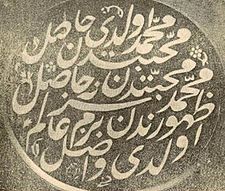Bezm-i Alem
| Bezm-i Âlem Sultan | |
|---|---|

Seal of Bazm-î Âlem Valide Sultan
|
|
| Valide Sultan of the Ottoman Empire | |
| Tenure | 2 July 1839 – 2 May 1853 |
| Predecessor | Nakşidil Sultan |
| Successor | Pertevniyal Sultan |
| İkinci Kadın of the Ottoman Empire | |
| Tenure | 1832 – 1 July 1839 |
| Üçüncü Kadın of the Ottoman Empire | |
| Tenure | 1822 – 1832 |
| Born | 1807 Caucasia, Ottoman Empire |
| Died | 2 May, 1853 (aged 45–46) Dolmabahçe Palace, Constantinople |
| Burial | The tomb of Mahmud II, Çemberlitaş, Fatih, Istanbul |
| Spouse | Mahmud II |
| Issue | Abdülmecid I |
| Religion | Islam, previously Christianity |
Bezmiâlem Sultan (fully Devletlu İsmetlu Bezmiâlem Valide Sultan Aliyyetü'ş-Şân Hazretleri; 1807 – 2 May 1853) (Bezm-î Âlem or Bazim-î Âlam, meaning "feast of the world") was the second wife of Ottoman Sultan Mahmut II, and the mother of Sultan Abdülmecit I of the Ottoman Empire.
Majority of sources note that she was a Georgian Jewish whose birthname was unknown. She was educated by Esma Sultan, a sister of Mahmut II.
She is said to have been buxom and a bath attendant before entering the imperial harem. She had a beautiful face and extraordinary white and beautiful hands. She was married to Sultan Mahmud II in 1822. As mother of Sultan Abdülmecit I, she was Valide Sultan from 1839 to 1853. One source says Mahmud II died of alcoholism, rather than tuberculosis, and she is reported to have convinced Abdülmecit I to destroy his father's wine cellars. She was thirty one and was still young enough to despise and mistrust the elder non statesman who had made himeself minister. She advised her son to allow Hüsrev to incur the odium of seeking terms from M. Ali but urged him to resist the Grand Vizier's attempts to advance his nominees to important offices of the state. Abdülmecit duly played for time, awaiting Reşit's return from England before taking any major decisions on policy. His mother had given sound counsel. So shrewd was her judgement of men and their motives that the Valide Sultan continued to influence the choice of ministers until shortly before her death fourteen years later. Bezmialem also recommended Reşit to Abdülmecit because she believed he understood what Mahmut had been seeking to achieve in his reform programme.
She was popular and respected as Valide Sultan and she also exerted political influence. It is noted that her son and his ministers consulted her on the affairs of state. Like other influential Ottoman women, she was a patron of arts and architecture. Amongst notable structures she commissioned are Kasr-i Dilküşa (Dilküşa Summer Palace) at the Yıldız Palace complex, Bezm-î-Âlem Valide Sultan Fountain, and Dolmabahçe Mosque in Istanbul. Her burial place is located at Divanyolu Street inside the tomb of Mahmut II in Istanbul.
...
Wikipedia
